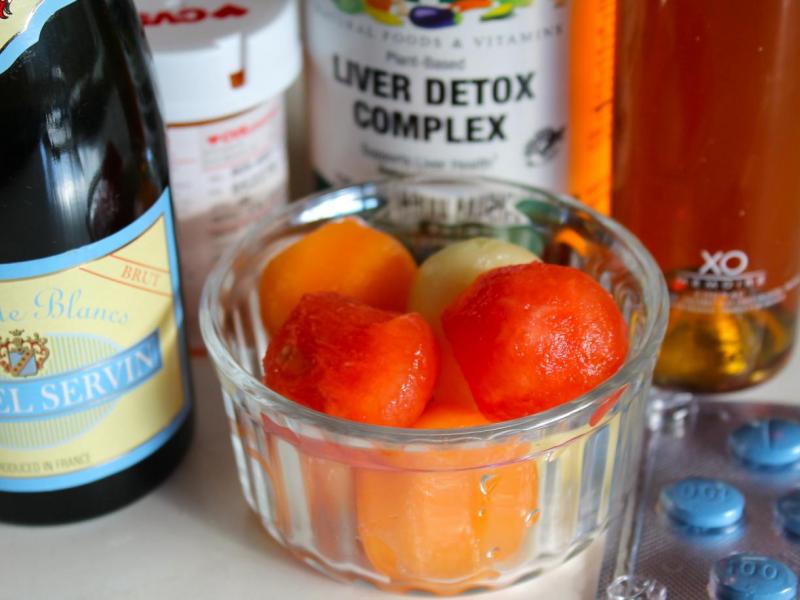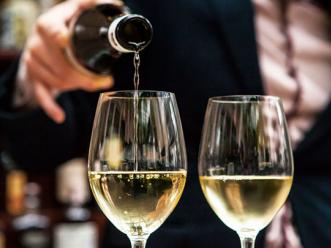
We in the wine and spirits industry consume lots of alcohol; it’s part of the job. But what do we do to protect our own health? It’s a question that’s been on my mind for a while. Personally I take a natural liver detox supplement heavy on milk thistle every day, and I’ve consumed two liters of water every day for decades. In addition to daily hikes I use a steam room at least once a week to help pull toxins out of my body. But what do others do to maintain optimal health in the face of unlimited alcohol?
About Your Liver
When you consume wine, a cocktail or beer, about 20-25% of that alcohol is absorbed straight from your stomach into your bloodstream. Once alcohol has entered your bloodstream it remains in your body until it’s processed via your liver, and about 90-98% of alcohol you drink is broken down in your liver. The other 2-10% is removed primarily through peeing. How quickly you absorb the alcohol - on average the liver can process one ounce of alcohol per hour - depends on several factors; body weight, food consumption, genetics, etc. So if you drink alcohol faster than your body can process it your blood alcohol level will continue to rise. This is why it’s always best to have food with our drinks as food slows down the alcohol absorption rate. Otherwise your liver gets overwhelmed. Additionally, the amount of alcohol is important, and not just two or three drinks, but percentages. Obviously bourbon is higher by volume than pinot blanc. So your liver is the workhorse; that three-pound organ that takes care of you.
About Everyone Else’s Liver
The industry is not merely winemakers, distillers and Sommeliers. There are wine and spirits writers, educators, PR firms, distributors, winery and distillery owners, brewers, tasting room staff, wine judges, and associations, who all come into contact with more alcohol than most people. Elliot Dolin, owner of Dolin Vineyards in Malibu, makes it a point to maintain a daily vitamin and supplement regimen. “Especially B vitamins such as niacin, B6 Complex and a B12/Folate combination,” he tells me. And Dolin, like me, uses a milk thistle/turmeric root supplement. Jose Valdez is the Head Distiller of Tequila Partida. “I run half and full marathons. It helps me physically and mentally prepare for the day. I discipline myself and drink no more than one drink every hour and no more than three total when I'm going to run the next day. I also make sure to drink two glasses of water per drink. Despite the industry I'm in, I don't have to finish every drink. If you're going to drink, drink the high quality stuff like Partida, Macallan, Highland Park, you get the picture.”
Wine writers like Matt Kettmann, Central Coast Reviewer for Wine Enthusiast, and Joe Roberts, one of the top wine bloggers in the US at 1 Wine Dude, routinely taste between 200 and 300 wines every month. “In addition to drinking tons of water daily, I ride my bike at least three to four times a week to keep the blood flowing,” says Kettmann. “And, this should go without saying, but I’m spitting wine constantly. If I didn't do that while reviewing I'd already be dead.” As Joe Roberts explains, the one aspect of a career in adult beverages that is often overlooked is the impact on overall health. “I've had two gum grafts, so I know the hard way the dangers of alcohol and acid exposure in the mouth from tasting hundreds of wines in short order. Alcohol provides empty calories so it's even more important to have a regimen that includes regular exercise - I'm partial to running and martial arts based programs. I also take at least two days ‘off’ per week where I'm neither tasting nor drinking, to give both my body and my palate a break.”
Those in the PR field too have to contend with winemaker dinners, sampling wines for new clients, and running press trips where wine and spirits flows abundantly. Juliana Colangelo of Colangelo & Partners blocks out two days each week where she refrains from drinking any alcohol. “I find that keeping a couple days booze-free helps keep my week balanced and gives my liver a rest,” she says. For Katherine Jarvis of Jarvis Communications based in Los Angeles she aims to work out 4-5 days a week. “Once a week at Jarvis Communications we have a personal trainer meet us in the park near our office for a work out.” And twice yearly she does a 5-day detoxifying cleanse. “It’s like hitting the re-set button,” she says. “Also during the year I also consume a lot of antioxidants - from coffee daily to a few Brazil nuts once a week to bitter veggies like mustard or dandelion greens.”
Perhaps for women alcohol consumption offers different challenges. Marcy Eberle of Eberle Winery in Paso Robles told me, “No one gives you a handbook about how to survive the wine industry, especially if you’re a woman who needs to manage her weight and has a lower tolerance than men.” Her solution was to not drink at all and focus on exercise, water, dandelion root tea, and a ‘clean mind.’ Eileen Crane, Winemaker at Domaine Carneros is a veteran sparkling winemaker of 42 years. “I’ve learned how to keep wine to the moderate level at which they should be enjoyed. When I’m hosting events I allow myself one glass and a sip only of additional wine. In social situations, I will have two to three glasses. I usually have an all-vegetable green drink every other day. My advanced degree is in nutrition and I believe eating right is always better than supplements.”
Weight is the enemy, suggests Xavier Barlier, Senior VP Marketing and Communication at Maison Marques & Domaines USA. “I do taste a lot but I drink fairly moderately: only wines with clear origins and always with food. Drinking water is mandatory, and finally regular exercise.” But a winemaker's job is physically demanding and during harvest many don’t have time for the gym. For Jesse Katz, Founder and Winemaker at Aperture Cellars climbing hillside vineyards and up and down ladders in the winery helps. “Throughout the year, I stay active outside by biking, snowboarding, and hiking. Most importantly, with over 60 small farms no more than a 15-minute drive from my house I am never lacking for a huge variety of fresh, organic produce here in Sonoma.”
Drink less, but better is an overall theme, along with proper diet and exercise. But looking at European traditions offers additional wisdom. “Wine has been a natural part of my upbringing so I am inclined to not see wine as a threat to my health,” says Tancredi Biondi Santi, 7th generation of the Brunello di Montalcino producer, Biondi-Santi Brunello. “I’m very conscious that the abundance of food and wine in our line of work calls for a precise commitment to maintain a sound and healthy body.” He makes sure when he travels and has late-night wine dinners and early morning meetings, he plots time for a work out. “When wine is a natural part of your lifestyle, like it has always been in Tuscany where meals are most often accompanied by a glass of wine, it leads to a healthy attitude towards alcohol.”





